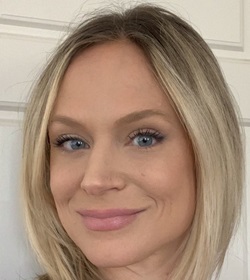2024 Irene Adler Prize
 Heidi VanderVelde is the winner of the 2024 Irene Adler Prize for women writers for her essay, “Returning.” It appears below.
Heidi VanderVelde is the winner of the 2024 Irene Adler Prize for women writers for her essay, “Returning.” It appears below.
VanderVelde, who receives $1,000 toward her education, is seeking her M.F.A. in fiction at Warren Wilson College.
It is the second time, including 2018, that the essay competition winner has been associated with this Asheville, North Carolina college.
Honorable mentions go to:
Sally Cranswick (“Eve-olution Revolution”), who is pursuing her Ph.D in creative writing at South Africa’s University of the Western Cape.
Candice Menefee (“Becoming a Champion”), who is seeking her B.A. in English literature at the University of Central Florida.
Returning
By Heidi VanderVelde
My mother and I sit on the sand of Indian Rocks Beach, Florida, where my four-year-old son and I are visiting from Alabama. This cozy beach town where I grew up, where my mother still lives, is now a told secret. Instead of a smattering of locals on the shore, there are flocks of children and parents, teenagers, and young adults; their bodies are burnt pink and red by the sun. Despite the fluttering of activity, I can only think of the rarity of the moment, of being with my mother.
She takes her phone out, records my son playing twenty feet in front of us; she’s watching him and smiling at the screen; he’s playing like her children once did, like I once did. He scoops sand with a neon yellow plastic shovel into a matching bucket, then runs to the shore, digs again. He finds and sprinkles pastel shells of coquinas into his pail. My mother’s face is relaxed, happy. She’s smiling in a way I haven’t seen since I was a child.
I’m not surprised that my parents visited this area thirty-five years ago and decided to stay, but my mother and I are running out of time. We’re getting older, and I no longer assume the answers to questions I need to ask her. So I ask why she and my father suddenly moved from Indiana to this beach town with four young children. She answers, “Because of pain.”
I think I know what she’s referring to. But for now, I don’t delve into it; I leave her answer in the air smelling of seawater and seaweed, where it dissipates, dissolves. I know of my father’s infidelity, which, from what I remember, prompted the move. I know how they hated the bleak Midwestern cold, one of the only things they seemed to agree on.
“Do you remember how much time we spent at the beach when you were little?” she asks. “You and Dad fishing?”
I nod. But my father is dead now. I’d rather not think of it. I call my son back to us, to reapply his sunblock. He looks longingly at the Gulf as I rub lotion onto his arms, then squirms from my sunscreen-lathered hands. But instead of going to the sea, he goes to my mother, hugs her, then runs off. The bliss is still on her face as he goes.
My mother and I are alone, then. I want to ask her if she ever felt like moving from the beach when my father repeated the same mistakes here. I want to understand why, as an adult, I both seek this place and look forward to leaving it. But the moment is too tender, too painless. Instead, we listen to the Gulf, see my son dump the contents of his bucket near the water’s edge. He watches as the coquina shells burrow back into the damp sand, into the familiar constriction of their homes.
